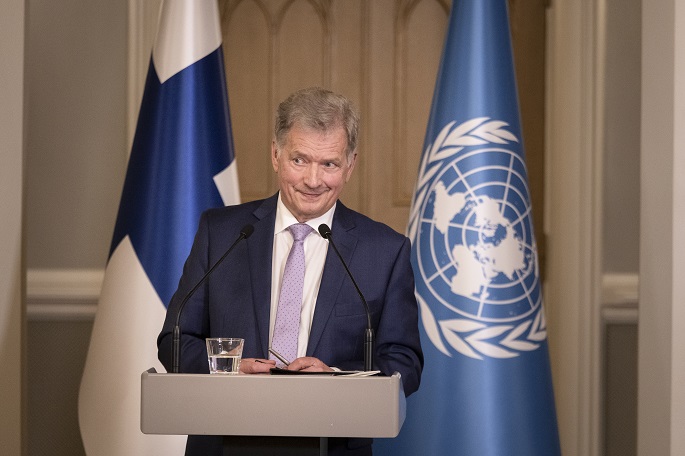Niinistö stresses joint efforts against COVID pandemic
Published : 24 Sep 2020, 00:19
Updated : 24 Sep 2020, 01:15
President Sauli Niinistö on Wednesday emphasised facing the coronavirus pandemic through joint global efforts.
In his remote address to the 75th General Debate of the United Nations General Assembly, he also underscored the importance of climate action and women’s rights.
“When this pandemic broke out, our initial reaction was not to unite behind multilateral efforts. Instead of a much-needed global response, we witnessed a series of national responses,” said Niinistö.
The president expressed his unwavering support for the UN system in general, and the World Health Organization in particular, for their efforts to manage the fight against the pandemic.
“An effective global response can only come from all of us together. From the United Nations. I would like to reiterate our unwavering support for the UN system in general, and the World Health Organization in particular, for their efforts to manage the fight against the pandemic. I also would like to express my appreciation for the strong leadership Secretary-General António Guterres has shown during this crisis,” added Niinistö.
He also focused on proper climate action to implement the Paris Agreement properly.
“We must not lose sight of the even more persistent existential threat to humanity. Climate change. Our lives may have been on lockdown this year, but climate change has not stopped for a moment. The urgency of bold and swift climate action is growing by the day. Our commitments to the Paris Agreement must prevail. We must redouble our efforts for their implementation,” said the Finnish president.
He emphasised working actively in international partnerships on climate issue.
“The Coalition of Finance Ministers for Climate Action led by Finland and Chile has grown to include more than 50 countries. This cooperation helps countries integrate climate considerations into economic, fiscal and financial policies,” said he.
The president assured that Finland is ready to do its share. The Finnish government stands firmly behind its aim to make Finland climate neutral by 2035, and thus become the world’s first fossil-free welfare society.
“We will continue to integrate sustainable development into our state budget. We are determined to transform Finland into a socially, economically and ecologically sustainable society during this decade,” Niinistö added.
He also viewed that no government should use the crisis as a pretext to violate human rights or to limit democratic and civic space.
“No government should adopt measures that undermine the respect of the rule of law and of international commitments,” said the president.
The Beijing Declaration and Platform for Action, the most progressive document ever on the rights of women and girls, was adopted twenty-five years ago, he said, adding that unfortunately, this anniversary is not the only reason why it is so topical this year. The pandemic has hit women particularly hard.
“The harsh economic and social implications for women have reversed the progress achieved during the last decades. The attempts to undermine women’s and girls’ rights, especially their sexual and reproductive health and rights, continue,” said the president.
He pointed out that for Finland, advancing women’s and girls’ rights and gender equality is of fundamental importance. In the Generation Equality process, Finland has a leading role in bridging the digital divide between genders.
He also asked for efforts to reverse the trend of waning multilateralism, and asked states to have good faith in international affairs.
"Precisely when the demand for global solutions is rising, our ability to provide them is weakening," Niinistö said.
"Multilateralism suffers from inward-looking nationalism and great-power competition alike. The institutions that we have built together over decades are under growing pressure. International agreements, norms and principles are increasingly challenged and interpreted in ways which weaken both their potential and their legitimacy," he noted.
Ultimately, if respect for the commonly agreed rules disappears, there will be not much left of a rules-based order, he warned.
"We need to reverse this trend. More than ever, we need effective multilateral cooperation. More than ever, we need the United Nations. It is not only the common responsibility of all of us -- the member states -- to make it stronger. It should be obvious that it is our common interests, too."
Niinistö stressed the need for international institutions to adapt to changing circumstances, but advised against the dismantling of them.
New actors and new technologies create new kinds of challenges. Old structures and old instruments alone will not be sufficient to respond to them. But discarding existing frameworks would create a dangerous vacuum, he warned, giving the example of nuclear disarmament.
"With one agreement after the other lapsing, we soon risk losing even the last elements of nuclear arms control. It would be of fundamental importance for the nuclear weapons states to find a way to build mutual understanding and trust," said the President.
At 75 years of age, he said, the UN Charter remains a remarkable blueprint for the future -- for a more peaceful, a more sustainable, and a more just world. But the promise comes with an important condition: states must engage in good faith.
He cited Article 2 of the UN Charter as stating: "All Members, in order to ensure to all of them the rights and benefits resulting from membership, shall fulfill in good faith the obligations assumed by them."


